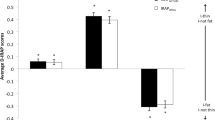Abstract
Objective: Lack of self-esteem may play an important role in the development of eating disorders (ED). This study investigated the differential impact of positive and negative feedback on implicit and explicit self-esteem in women with an ED (N=25) as compared to women without an ED (N=29). Method: False feedback (positive or negative) was given on participant’s performance on a specifically developed intellectual test. Before and after the performance, explicit and implicit self-esteem was measured. Results: On the explicit measure ED patients reacted congruently with the nature of the feedback. On the implicit measure only ED patients responded to the positive feedback with an improvement of self-esteem, with no effect for negative feedback. The control group was unaffected by either feedback. Furthermore, no correlation was observed between the explicit and implicit measures, a finding suggesting that these measurements tap different constructs. Conclusion: Positive feedback affects implicit self-esteem of female patients with eating disorders. The results underline the importance of positively approaching women with ED.
Similar content being viewed by others
References
Cooper P.J., Fairburn C.G.: Confusion over the core psychopathology of bulimia nervosa. Int. J. Eat. Disord., 13, 185–389, 1993.
Fryer S., Waller G., Kroese B.S.: Stress, coping, and disturbed eating attitudes in teenage girls. Int. J. Eat. Disord., 22, 427–436, 1997.
Vohs K.D., Bardone A.M., Joiner T.E. Jr., Abramson L.Y., Heatherton T.F.: Perfectionism, perceived weight status and self esteem interact to predict bulimic symptoms: A model of bulimic symptoms development. J. Abnormal Psychol., 108, 695–700, 1999.
Vohs K.D., Voelz Z.R., Pettit J.W., Bardone A.M., Katz J., Abramson L.Y., Heatherron T.F., Joiner T.E. Jr.: Perfectionism, body dissatisfaction, and self-esteem: A model of bulimic symptom development. J. Soc. Clin. Psychol., 20, 476–497, 2001.
Waller G., Dickson C., Ohanian V.: Cognitive content in bulimic disorders: Core beliefs and eating attitudes. Eat. Behav. 3, 171–178, 2002.
Fairburn C.G., Cooper Z., Shafran R.: Cognitive behaviour therapy for eating disorders: a “transdiagnostic” theory and treatment. Behav. Res. Ther., 41, 9–28, 2003.
Vanderlinden J.: Anorexia nervosa overwinnen in 13 stappen [Overcoming anorexia nervosa in 13 steps]. Tielt, Lannoo, 2005.
Vanderlinden J.: Boulimie en eetbuien overwinnen in 10 stappen [Overcoming bulimia and binge eating in 10 steps]. Tielt, Lannoo, 2008.
Greenwald A.G., Banaji M.R.: Implicit social cognition: attitudes, self-esteem, and stereotypes. Psychol. Rev., 102, 4–27, 1995.
Hasher L., Zacks R.T.: Automatic and effortful processes in memory. J. Exp. Psychol., 108, 356–389, 1979.
Hartlage S., Alloy L.B., Vasquez C., Dykman B.: Automatic and effortful processes in depression. Psychol. Bull., 113, 247–278, 1993.
De Houwer J.: What are implicit measures and why are we using them. In: Wiers R.W., Stacy A.W. (Eds.), The handbook of implicit cognition and addiction. Thousand Oaks, CA, Sage Publishers, 2006, pp. 11–28.
Greenwald A.G., McGhee D.E., Schwarz J.L.K.: Measuring individual differences in implicit cognition: The Implicit Association Test. J. Pers. Soc. Psychol., 74, 1464–1480, 1998.
Rothermund K., Wentura D.: Figure-ground asymmetries in the Implicit Association Test (IAT). Z. Exp. Psychol., 48, 94–106, 2001.
De Houwer J.: The extrinsic affective Simon task. J. Exp. Psychol., 50, 77–85, 2003.
American Psychiatric Association. Diagnostic and Statistical Manual of Mental Disorders. 4th ed. Washington, DC, American Psychiatric Association, 1994.
Kamphuis J.H., De Vente W.: Rosenberg Self-Esteem Questionnaire: Dutch Translation. Unpublished document, 2000.
Vermeulen N., Corneille O., Luminet O.: A mood moderation of the Extrinsic Affective Simon Task. Eur. J. Pers., 21, 359–369, 2007.
Shimizu M., Pelham B.W.: The unconscious cost of good fortune: Implicit and explicit self-esteem, positive life events, and health. Health Psychol., 23, 101–105, 2004.
Cai H.: Explicit self-esteem, implicit self-esteem and depression. Chinese Mental Health J., 17, 331–336, 2003.
Franck E., De Raedt R., De Houwer J.: Implicit but not explicit self-esteem predicts future depressive symptomatology. Behav. Res. Ther., 45, 2448–2455, 2007.
Spalding L.R., Hardin C.D.: Unconscious unease and self-handicapping: Behavioral consequences of individual differences in implicit and explicit self-esteem. Psychol. Sci., 10, 535–539, 1999.
De Raedt R., Schacht R., Franck E., De Houwer J.: Selfesteem and depression revisited: Implicit positive selfesteem in depressed patients? Behav. Res. Ther. 44, 1017–1028, 2006.
Dijksterhuis A.: Personality processes and individual differences — I like myself but I don’t know why: Enhancing implicit self-esteem by subliminal evaluative conditioning. J. Pers. Soc. Psychol., 86, 345–354, 2004
Author information
Authors and Affiliations
Corresponding author
Rights and permissions
About this article
Cite this article
Vanderlinden, J., Kamphuis, J.H., Slagmolen, C. et al. Be kind to your eating disorder patients: The impact of positive and negative feedback on the explicit and implicit self-esteem of female patients with eating disorders. Eat Weight Disord 14, e237–e242 (2009). https://doi.org/10.1007/BF03325124
Received:
Accepted:
Published:
Issue Date:
DOI: https://doi.org/10.1007/BF03325124




